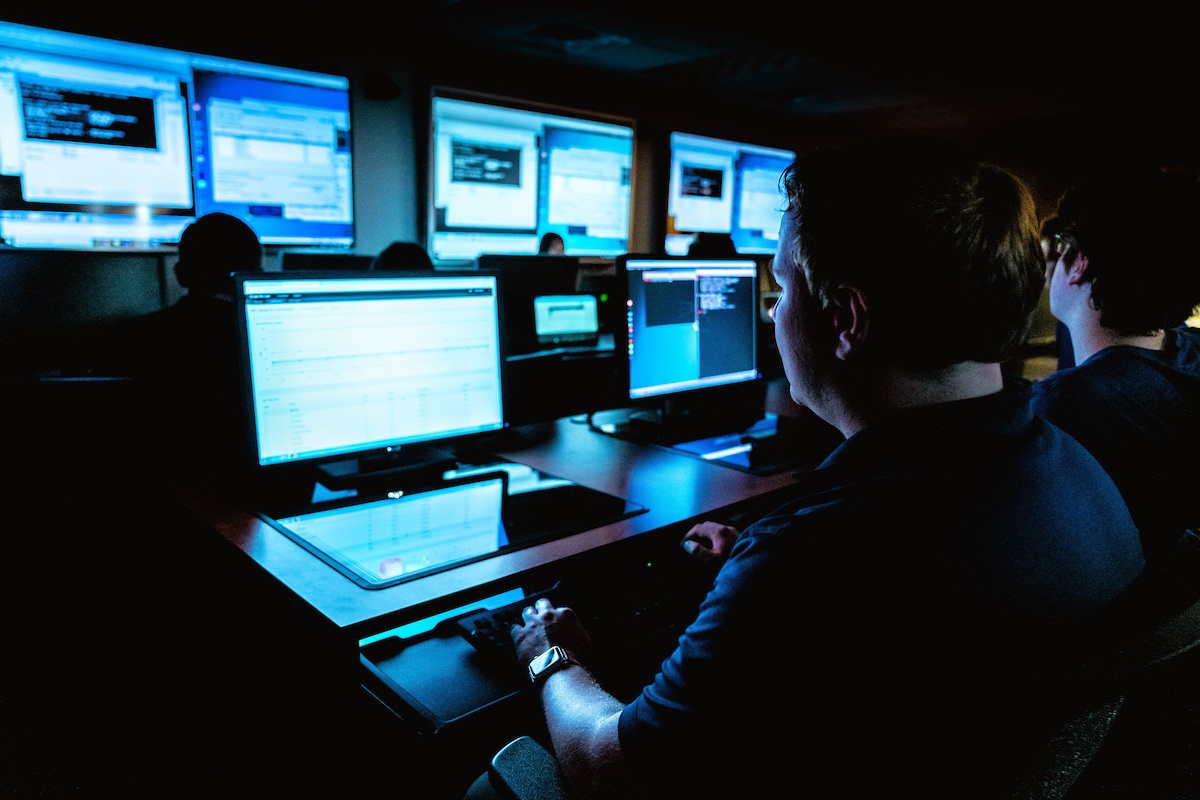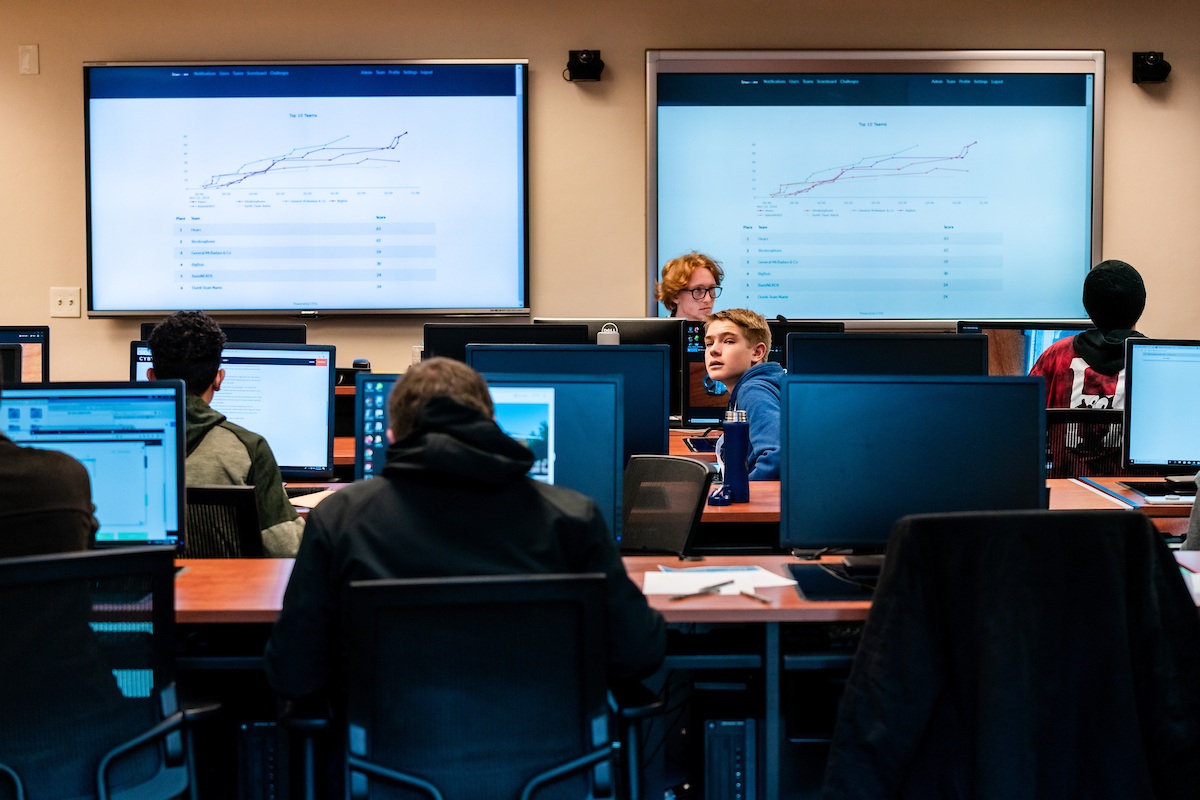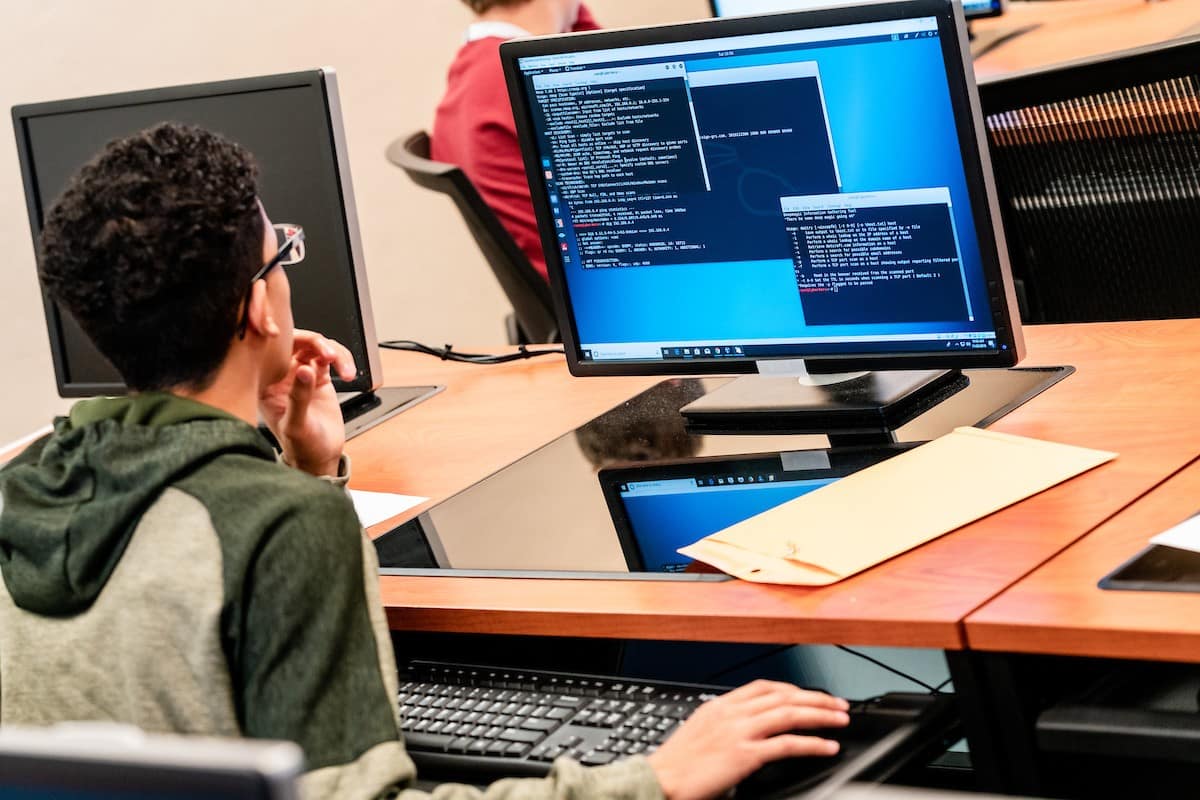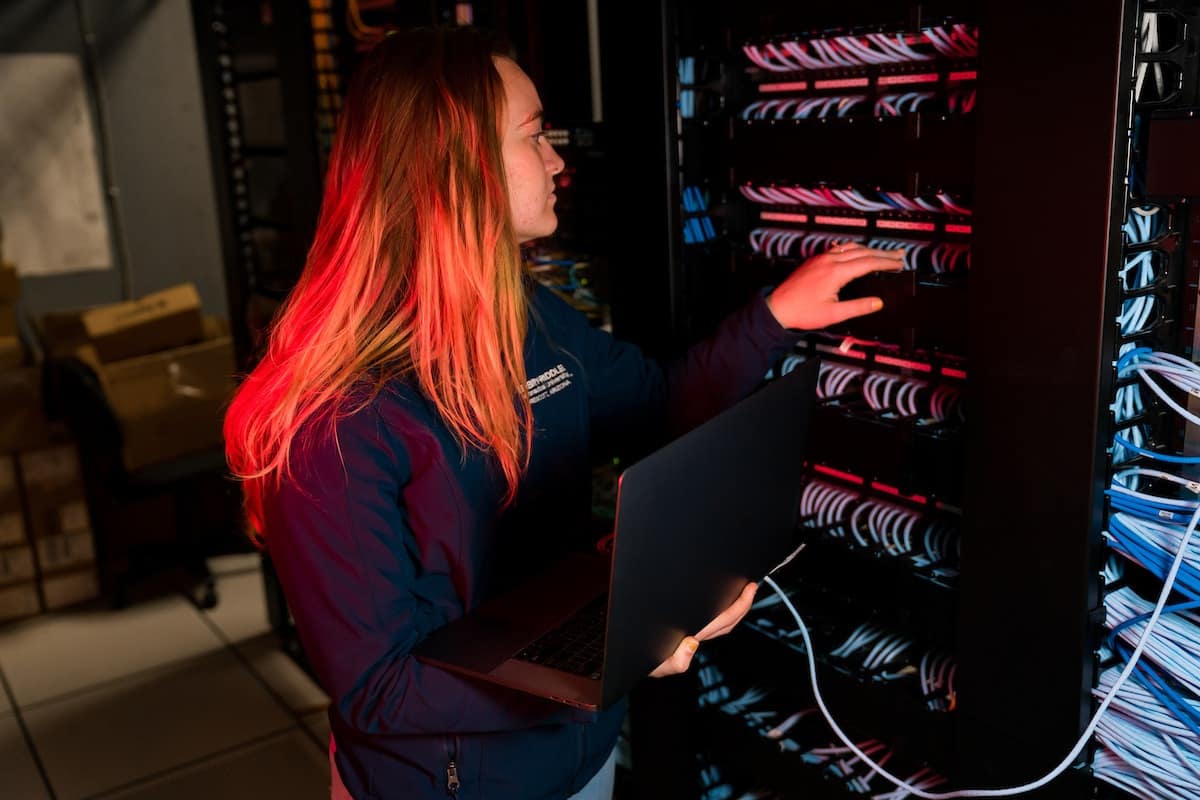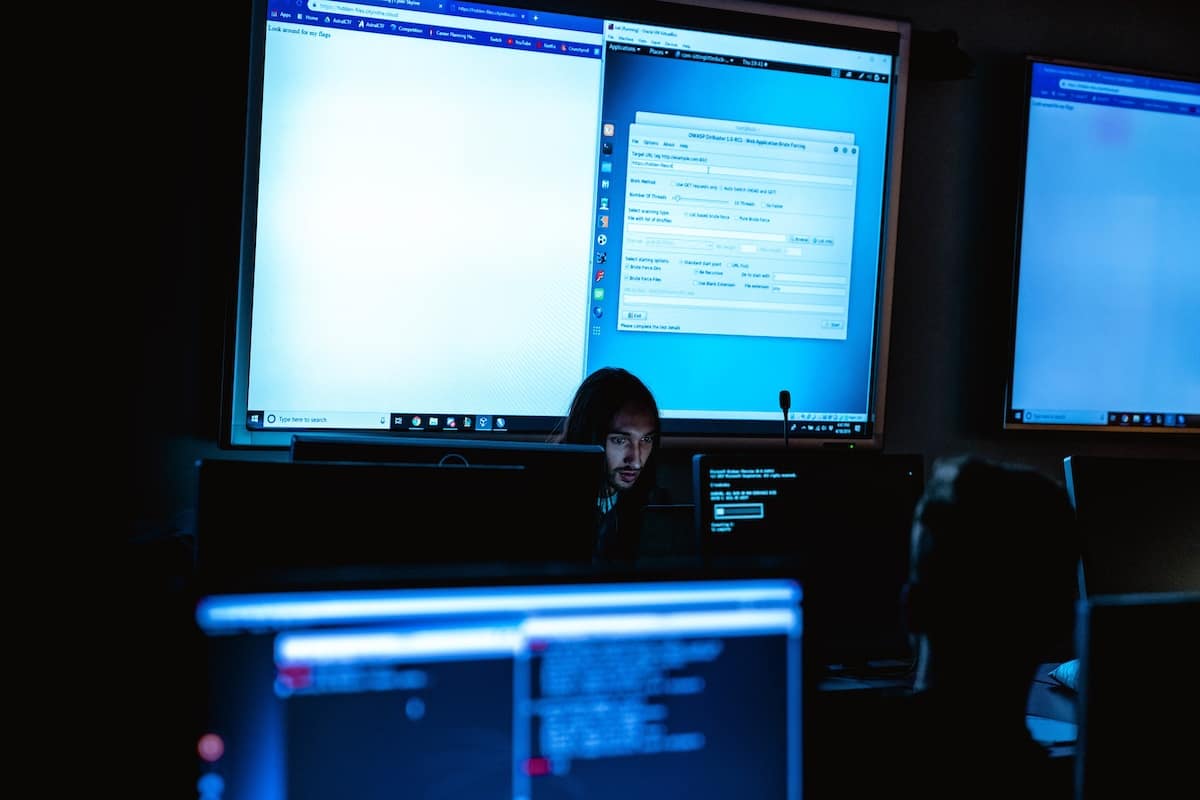Cyber Lab Equipment and Resources
24 dedicated workstations are currently available for student use. A podium computer projected to large screens is used to control lecture material and access software and network tools. Video conferencing capability is provided. A dedicated attached server room with isolated network layers and multiple operating systems and servers supports research, instruction, competition participation and access to Cyber Warfare Ranges in the AZ state. Four dedicated digital forensics stations allow investigation of a variety of hardware and software.
The lab setup is continuously growing with future plan involving: addition of a GPU server for deep learning; addition of industrial control systems, UAS and IoT devices for cyber-physical range capability; addition of donated software and hardware for cyber education from various companies, including Symantec and Juniper Networks; extension of lab resources to 32 computers located in another campus classroom; extension of the lab to an emerging Prescott-based Cyber Range; and a dedicated technician for lab maintenance.
Cyber Lab History and Usage
The Cyber Lab was founded in the year 2013, with the bold vision of enabling students to rise up to the grand challenge of defending against an adversary in cyberspace evolving at Internet speeds. Enabling students with a safe environment to take an intelligence-driven cyber defense approach of: “to know your adversary, you must become your adversary.”
The core CIS Department cyber courses are conducted in the Cyber Lab. Students often refer to this lab as the “Hacker Lab,” where they learn hands-on about how information and systems can be compromised as well as practice cyber defense techniques against real-world cyberattacks. Using the Cyber Lab’s resources students hack and perform penetrative tests on computer operating systems, services and applications, developing skills in identifying, assessing and mitigating real-world vulnerabilities. Students study and reverse engineer malware to understand how to better defend against computer viruses and worms. Students also learn how to perform a forensic examination of a computer system and a network to identify hidden files and capture digital evidence. Student also engage in identification, collection and analysis of information for Open Source Collection and Analysis (OSINT).
In addition, department supported and faculty mentored Cyber Clubs — involving students from around campus — meet in the Cyber Lab to discuss cyber security challenges, practice for competitions, work on external projects or create their own research or investigations using various versions of Linux, open source software tools and industry standard access control and security software.
A number of Cyber Clubs have emerged in the Cyber Lab over the years including: the Cyber Defense Club (CDC), the Ethical Hacking Club, the CyberEye, the C-Sec and the Information Security Offensive Research Team (ISORT). The CDC club, for instance, is actively involved in national-level cyber competitions, such as: DOE’s CyberForce, A-ISAC’s Capture-The-Flag, Hack Arizona, MITRE Capture-The-Flag, National Cyber League, National Collegiate Cyber Defense Competition and SAE’s CyberAuto Challenge.
Summer camps, workshops for Girl Scout Cybersecurity Badges and other outreach activities of the CIS Department are also held in the Cyber Lab.
Faculty and Affiliates Research
CIS Department faculty and affiliate members have been using the Cyber Lab for multi-disciplinary research topics. In addition, the department has been collaborating with the CyBASE Center in Daytona Beach and is funded in part by federal, state and local sources in addition to University support.
Catalina Aranzazu-Suescun, Ph.D. Assistant Professor of Cyber Intelligence and Security - Research interests include UAVs, wireless networks and Internet of Things.
Jesse Chiu, M.S. Instructor, Cyber Intelligence and Security - Research interests include OSINT, computer network and drone cybersecurity.
Jon C. Haass, Ph.D. Professor, Cyber Intelligence and Security of Security and Intelligence - Dr. Haass was appointed to the State of Arizona Governor’s Council to join the Arizona Cybersecurity Team. He is also an Advisory Board member of Arizona Cyber Threat Response Alliance. His research interests focus on security for Internet of Things, Threat Intelligence and AI applied to Intrusion Detection.
Krishna Sampigethaya, Ph.D. Associate Professor and Chair of Dept. of Cyber Intelligence and Security, College of Security and Intelligence - Research interests include aviation cyber security, transportation system security, software defined network security and cyber physical systems security.
Farid Dowla, Ph.D. Visiting Faculty of Cyber Intelligence and Security from Lawrence Livermore National Lab (LLNL), College of Security and Intelligence - Research interests include RFID security, big data analytics and machine learning and SIGINT.
Richard Finston, M.S. Adjunct Professor, College of Security and Intelligence - Area of expertise Intelligence Surveillance and Reconnaissance from aviation and space platforms
Steve Hooper, M.S. Assistant Professor, Global Security and Intelligence, College of Security and Intelligence - Areas of expertise homeland security, anti-terrorism, trans national criminal organizations
Matt Jaffe, Ph.D. Professor of Computer Science, College of Engineering - Research interests include secure coding, requirements for large mission critical software projects
Community Resources
Embry-Riddle is a Silver Sponsor of CyberPatriot and offers CyberPatriot scholarship opportunity for incoming cyber program students in Prescott and Daytona Beach campuses.
Embry-Riddle Aeronautical University Cyber Patriot Scholarship Application
The CIS Department is a part of the Greater Arizona Cyber Security community that includes small and large companies, governmental organizations and other academic partners:
AZ Cyber Talent provides a portal to resources for employers, students, organizations and academic partners to exchange ideas and reach out to the greater community.
The Arizona Cyber Warfare Range is a live-fire cyber warfare range created to augment the current cyber security resources in Arizona and drive innovation in cyber security techniques, technologies and training across the United States.
AZ Infragard is an alliance between the Arizona Office of the FBI and individuals committed to protecting the nation’s infrastructure and its people. The alliance’s mission is to help protect the nation’s infrastructure by supporting the priorities of the FBI and cultivating partnerships with the public and private sectors through bi-directional sharing of actionable information, training and educational events.
National Cyber Watch is a consortium of higher education institutions, businesses and government agencies focused on collaborative efforts to advance Information Security education and strengthen the national cybersecurity workforce.
Lab Information
Location: Bldg. 17, Rm. 127
Contact Us: To speak to someone about this lab or any of our facilities, call us at 928-777-6600 or 800-888-3728, or email Prescott@erau.edu.
Lab Directors: Jon Haass and Krishna Sampigethaya
Related Content
- College of Business, Security and Intelligence
- CBSI Industry Advisory Board
- Department of Cyber Intelligence and Security
- B.S. in Cyber Intelligence and Security
- M.S. in Cyber Intelligence and Security
- Information Technology Cybersecurity
- External Activities, News and Resources
- 360 View - Cyber Security Lab

